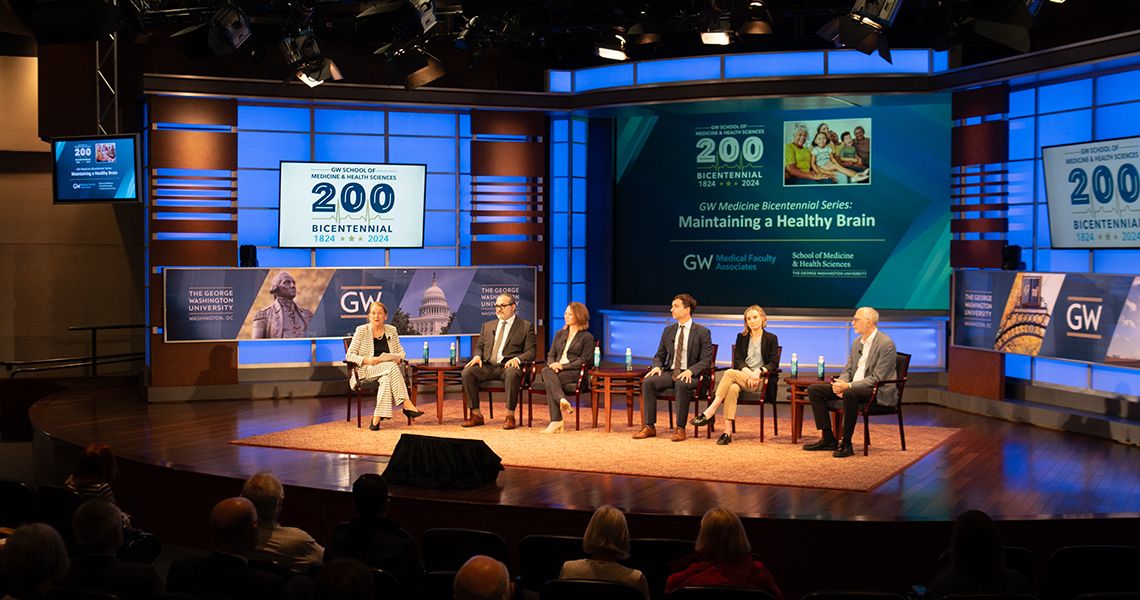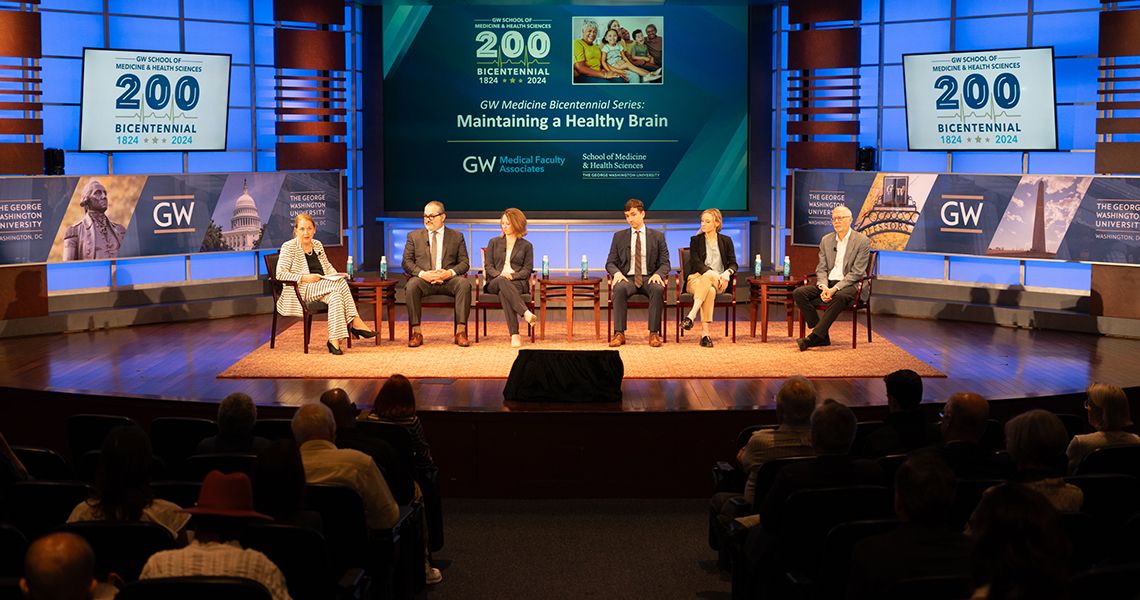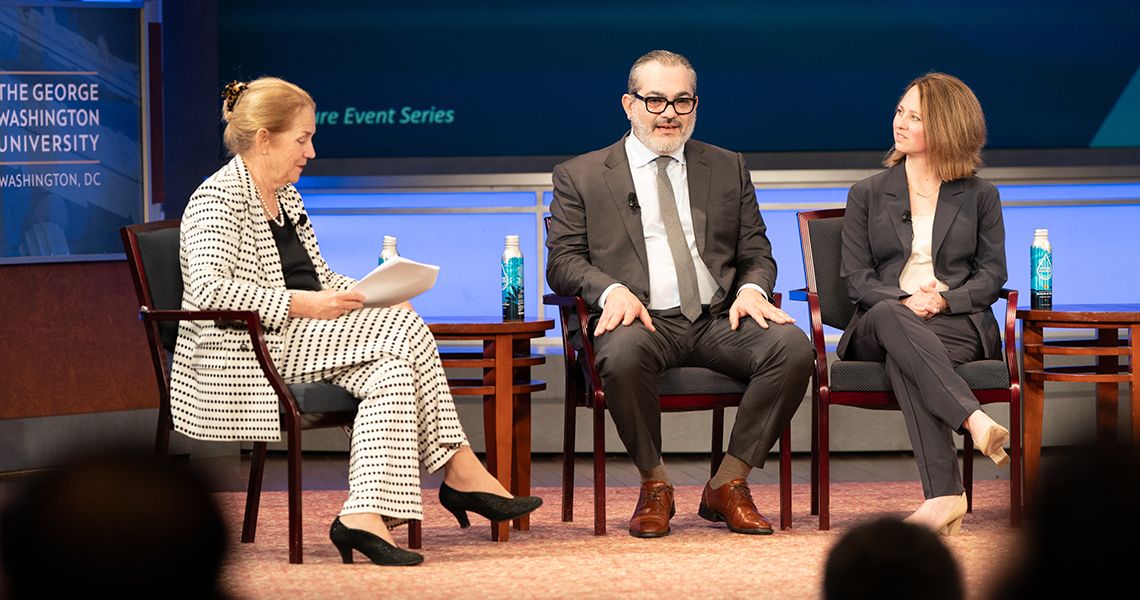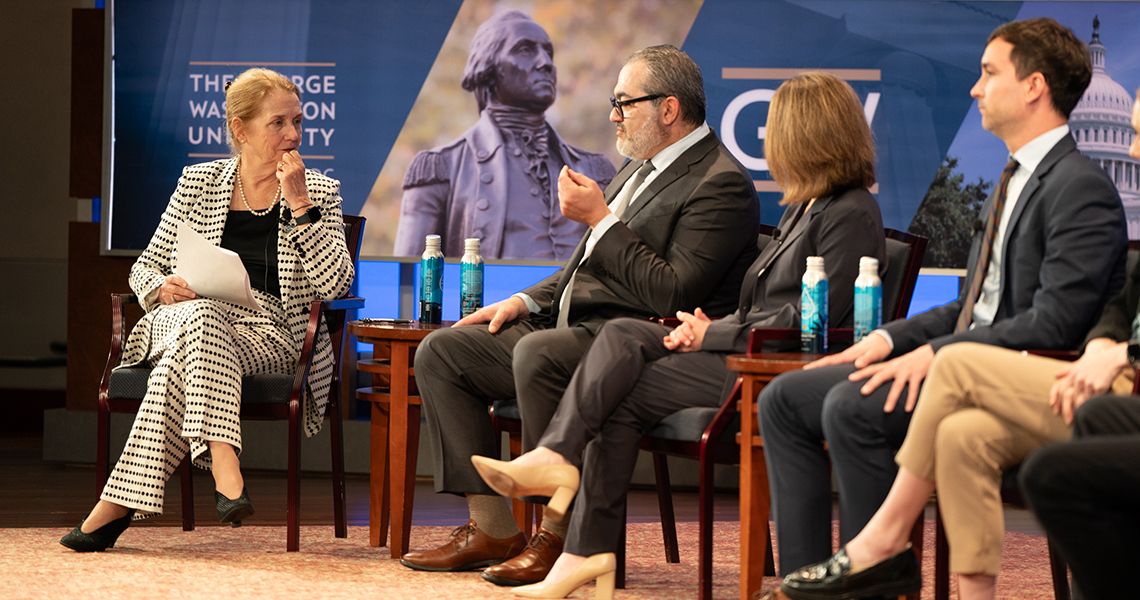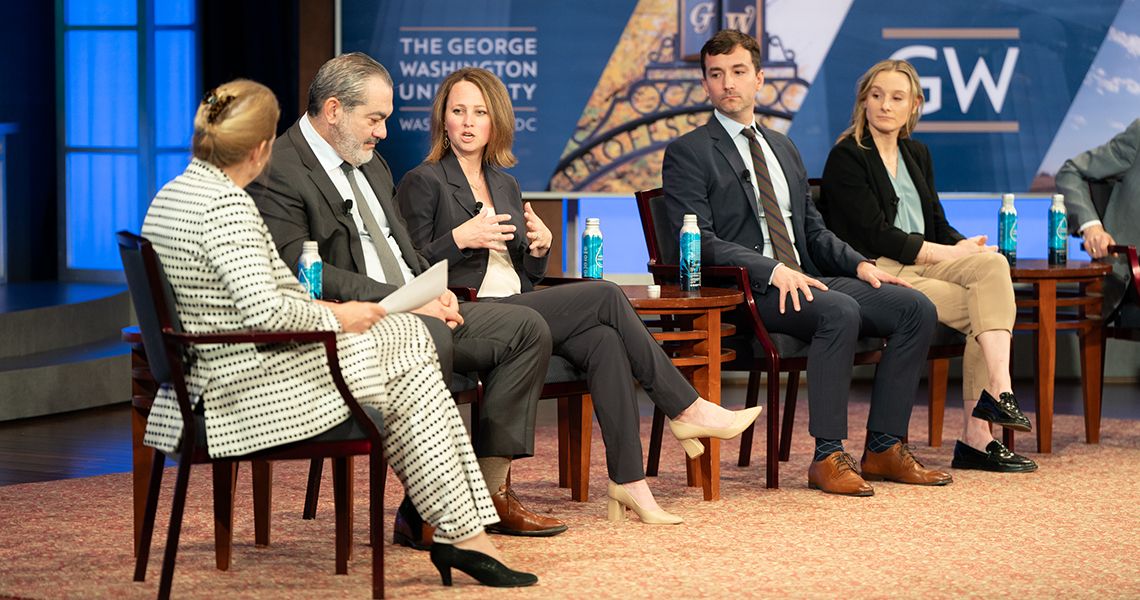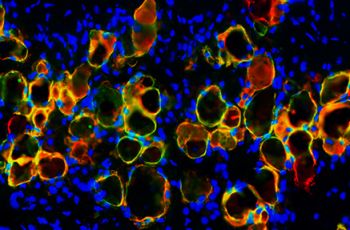The George Washington University School of Medicine and Health Sciences (SMHS) hosted the second installment of the George Washington University (GW) School of Medicine and Health Sciences Bicentennial Lecture Series, titled “Maintaining a Healthy Brain,” April 10.
The event featured panel of five GW brain-health experts representing neurology, geriatrics, and psychiatry and behavioral medicine exploring the aging brain; steps to optimize brain health; and clinical options for patients with Alzheimer’s disease, dementia, or stroke.
“We’re going to focus on brain health, we want to focus on health, not so much disease, but more on health and the things that we can do to keep our brains healthy, particularly as we age,” explained Bass, adding, “we have really spectacular and deep expertise, both on the fundamental discovery science side and particularly on the clinical trial and advancing science side as well as on our clinical enterprise.”
Steps to Support Brain Health
Like the inaugural Bicentennial Lecture, which focused on heart health, the “Maintaining a Healthy Brain,” the panel of neurologists, psychiatrists, and behavioral health experts agreed that many of the most important steps people can take to preserve and protect their brain function are the same basic tips — don’t smoke, eat healthy, exercise, keep your weight down, and control your blood pressure and cholesterol.
“When it comes to what can we do to maintain a healthy brain, there is a wealth of data supporting the benefits of diet, exercise, sleep, stress reduction, and social interaction and brain stimulating activities,” said Mohamad Koubeissi, MD, interim chair of the Department of Neurology and Rehabilitation Medicine, professor of neurology and rehabilitation medicine, and director of the Epilepsy Center at GW.
Diet is another crucial area, Koubeissi added. “Diets rich in saturated fat are not good for you. We should always try to eat the fruits and vegetables and healthy fats, such as omega 3 fatty acids found in fish, key features of the popular Mediterranean diet.”
Social interaction and brain stimulating activities are crucial for brain health, he added, calling them “exercise for brain cells.”
“If one embarks on lifelong learning of new languages, of reading books, of doing some digital exercises for the brain, for the memory, and what have you, it’s very helpful because it again increases what we call the cognitive reserves.”
Regular checkups with a primary care physician, said Koubeissi, are the best defense. “Your doctors would be able to tell whether your weight is good or not, whether your blood pressure is good or not, if your diabetes, your cholesterol is under control. Regular checkup would identify early on, issues that are reversible and that would maintain your overall health and your brain health.”
Making the Brain Body Connection
According to Henry Kaminski, MD, Meta A. Neumann Professor of Neurology at GW SMHS, there is an ever-increasing appreciation among researchers and health care professionals, that the brain and the immune system almost are one organism.
“There’s an interaction between our gut, which means what we eat and the bacteria in our gut, and how the immune system reacts, and how that's transmitted to the brain,” he said.
Kaminski is internationally recognized expert in the treatment of myasthenia gravis, a rare, chronic autoimmune neuromuscular disease characterized by varying degrees of weakness of the skeletal (voluntary) muscles of the body. Kaminski leads the Myasthenia Gravis Rare Disease Network, or MGNet, $7.8 million grant-funded research enterprise, leveraging global resources to examine MG from multiple angles — patient assessment technology, root causes and potential therapies.
Combating Effects of Aging
The brain experiences a host of changes as we get older, with few more noticeable and personal than memory. According to the Alzheimer’s Society, about 40 percent of adults will experience some former of memory loss after age 65. Understanding the difference between a normal age-related decline in sharpness and a more serious cognitive issue may take a specialist.
“It’s important to note that as we age our brains change, just like any other organ system in our body, and things tend to become a little bit less efficient. Our memory, attention, problem solving abilities, processing speed are all vulnerable to age-related cognitive decline,” said Stephanie Kielb, PhD, assistant professor of psychiatry and behavioral medicine, and an expert in evidence-based psychotherapy and conducting comprehensive neuropsychological evaluations.
“We really enjoy working within [the GW academic medical enterprise] and our colleagues in neurology,” said Antonio Puente, PhD, associate professor of psychiatry and behavioral medicine. Puente conducts neuropsychological evaluations of patients with psychiatric and neurological disorders such as Alzheimer’s disease or Parkinson’s disease, to characterize their cognitive, behavioral, and emotional functioning for diagnosis and treatment optimization. “I really feel like we can provide a home for people that need this interdisciplinary, treatment.
That depth of knowledge, interaction, and integration, he added, is a real quality of care differentiator. It’s not always easy, he explained, for one’s general practitioner to pin-down whether a patient’s memory problems normal or not normal in a standard visit.
“That’s what a lengthy, comprehensive exam can help with,” he said. “They can also help with the management of what we’re all talking about, the social factors and psychological factors that can impact not only your risk for developing things like dementia, but also your general mental health.”
Determining whether someone is experiencing ordinary forgetfulness or there something more serious behind that memory loss is what the GW Memory Clinic is all about. Christina Prather, MD, associate professor of medicine, director of Geriatrics and Palliative Medicine, and co-directs the Memory Evaluation and Treatment Clinic, evaluates patients with memory loss concerns, or established dementia, to provide quality care around what matters.
“Our Memory Clinic is not just our geriatric team that cares for people in our clinic, it extends to our speech and language pathologists who are part of the rehab program. It includes our social workers and all of our primary care practices, extending into our community partners with social work and navigation,” Prather explained.
“What we’re trying to determine,” Prather said, “is whether this something that we can change or modify or is this something that we have to figure out how to best live with?”
“I think what’s great about coming to an academic medical center for care, is that each of us is really trying to think about how to advance the field,” added Kaminski. “Patients have the opportunity to work with a physician who is thinking about the next steps of how to treat that disease.”
Up Next
The next GW Medicine Bicentennial Event for a public audience on May 14 on “Myths and Facts about Maintaining Healthy Skin” – featuring Department of Dermatology Chair Adam Friedman, MD.
Watch the full lecture on the Bicentennial Lecture series website.
